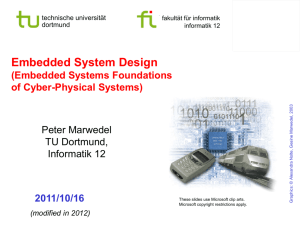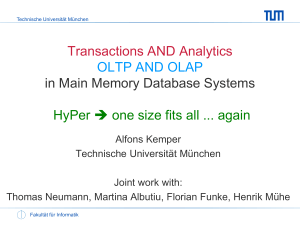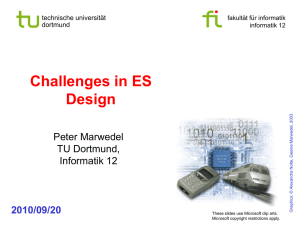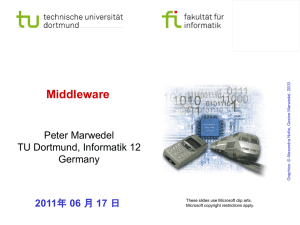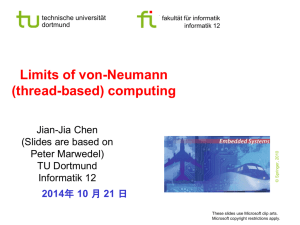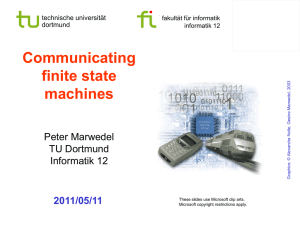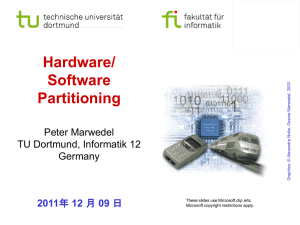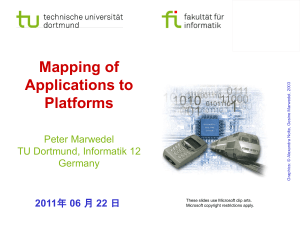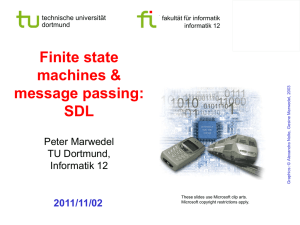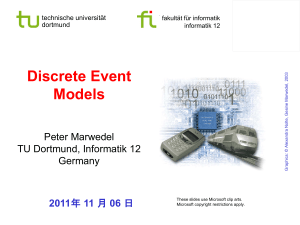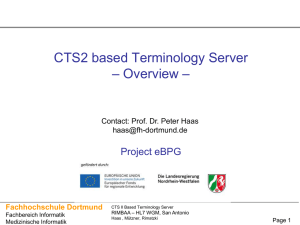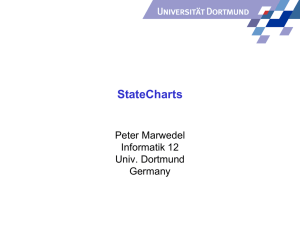PowerPoint-Präsentation
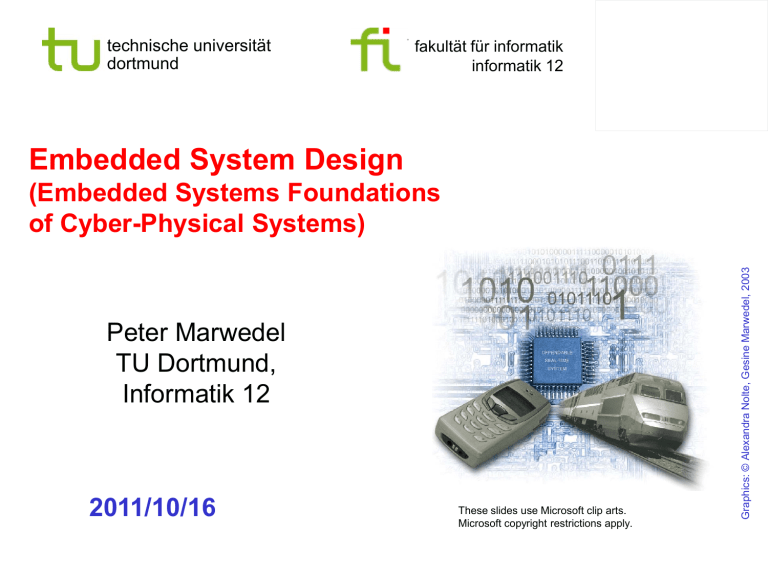
technische universität dortmund fakultät für informatik informatik 12
Embedded System Design
(Embedded Systems Foundations of Cyber-Physical Systems)
Peter Marwedel
TU Dortmund,
Informatik 12
2011/10/16
These slides use Microsoft clip arts.
Microsoft copyright restrictions apply.
Motivation for course (1)
According to forecasts, future of IT characterized by terms such as
Disappearing computer,
Ubiquitous computing,
Pervasive computing,
Ambient intelligence,
Post-PC era,
Cyber-physical systems .
Basic technologies:
Embedded Systems
Communication technologies technische universität dortmund fakultät für informatik
P.Marwedel,
Informatik 12, 2011
- 2 -
Motivation for Course (2)
“Information technology (IT) is on the verge of another revolution. …..
networked systems of embedded computers ... have the potential to change radically the way people interact with their environment by linking together a range of devices and sensors that will allow information to be collected, shared, and processed in unprecedented ways. ...
The use … throughout society could well dwarf previous milestones in the information revolution .”
National Research Council Report (US)
Embedded Everywhere, 2001 technische universität dortmund fakultät für informatik
P.Marwedel,
Informatik 12, 2011
- 3 -
Motivation for Course (3)
The future is embedded, embedded is the future
technische universität dortmund fakultät für informatik
P.Marwedel,
Informatik 12, 2011
- 4 -
What is an embedded system?
technische universität dortmund fakultät für informatik
P.Marwedel,
Informatik 12, 2011
- 5 -
Embedded Systems &
Cyber-Physical Systems
“Dortmund“ Definition: [Peter Marwedel]
Embedded systems are information processing systems embedded into a larger product
Berkeley: [Edward A. Lee] :
Embedded software is software integrated with physical processes. The technical problem is managing time and concurrency in computational systems.
Definition : Cyber-Physical (cy-phy) Systems (CPS) are integrations of computation with physical processes [Edward
Lee, 2006].
technische universität dortmund fakultät für informatik
P.Marwedel,
Informatik 12, 2011
- 6 -
Extending the motivation: Embedded systems and ubiquitous computing
Ubiquitous computing: Information anytime, anywhere. Embedded systems provide fundamental technology.
Communication
Technology
Optical networking
Network management
Distributed applications
Service provision
UMTS, DECT, Hiperlan, ATM
Embedded
Systems
Robots
Control systems
Feature extraction and recognition
Sensors/actuators
A/D-converters technische universität dortmund
Pervasive/ Ubiquitous computing
Distributed systems
Embedded web systems fakultät für informatik
P.Marwedel,
Informatik 12, 2011
© European Commission - 7 -
Growing importance of cyber-physical/ embedded systems
the global mobile entertainment industry is now worth some $32 bln…predicting average revenue growth of 28% for 2010 [www.itfacts.biz, July 8th, 2009]
…, the market for remote home health monitoring is expected to generate $225 mln revenue in 2011, up from less than $70 mln in 2006, according to Parks Associates.
[www.itfacts.biz, Sep. 4th, 2007]
Funding in the 7th European Framework
Creation of the ARTEMIS Joint Undertaking in Europe
Funding of CPS research in the US
Joint education effort of Taiwanese Universities
….
technische universität dortmund fakultät für informatik
P.Marwedel,
Informatik 12, 2011
- 8 -
Growing importance of cyber-physical
& embedded systems (2)
.. but embedded chips form the backbone of the electronics driven world in which we live ... they are part of almost everything that runs on electricity
[Ryan, EEDesign, 1995]
Creation of the ARTEMIS Joint Undertaking in Europe
Funding of CPS research in the US
Foundation for the “post PC era“
CPS & ES hardly discussed in other courses
CPS & ES important for TU Dortmund
CPS & ES important for Europe
Scope: sets context for specialized courses
Importance of education technische universität dortmund fakultät für informatik
P.Marwedel,
Informatik 12, 2011
- 9 -
technische universität dortmund
Application areas and examples
fakultät für informatik informatik 12
1.1 Application areas and examples
Application area Automotive electronics: clearly cyber-physical
Functions by embedded processing:
ABS: Anti-lock braking systems
ESP: Electronic stability control
Airbags
Efficient automatic gearboxes
Theft prevention with smart keys
Blind-angle alert systems
... etc ...
technische universität dortmund fakultät für informatik
P.Marwedel,
Informatik 12, 2011
© P. Marwedel, 2011
Multiple networks
Multiple networked processors
[Based on slide by J.Engblom] - 11 -
Application area avionics: also cyber-physical
Flight control systems,
anti-collision systems,
pilot information systems,
power supply system,
flap control system,
entertainment system,
…
Dependability is of outmost importance. technische universität dortmund fakultät für informatik
P.Marwedel,
Informatik 12, 2011
- 12 -
Medical systems: cyber-physical
For example:
• Artificial eye: several approaches, e.g.:
• Camera attached to glasses; computer worn at belt; output directly connected to the brain,
“pioneering work by William
Dobelle”.
Previously at
[www.dobelle.com]
Translation into sound; claiming much better resolution.
[http://www.seeingwithsound.com/etumble.htm] technische universität dortmund fakultät für informatik
P.Marwedel,
Informatik 12, 2011
- 13 -
Forestry machines: cyber-physical
technische universität dortmund fakultät für informatik
Networked computer system
Controlling arms & tools
Navigating the forest
Recording the trees harvested
Crucial to efficient work
“Tough enough to be out in the woods”
P.Marwedel,
Informatik 12, 2011
© Jakob Engblom - 14 -
Logistics
Applications of embedded/cyber-physical system technology to logistics:
Radio frequency identification (RFID) technology provides easy identification of each and every object, worldwide.
Mobile communication allows unprecedented interaction.
The need of meeting real-time constraints and scheduling are linking embedded systems and logistics.
The same is true of energy minimization issues technische universität dortmund fakultät für informatik
P.Marwedel,
Informatik 12, 2011
- 15 -
Smart Beer Glass
Capacitive sensor for fluid level
Contact less transmission of power and readings
© Jakob Engblom technische universität dortmund
8-bit processor
Integrates several technologies:
Radio transmissions
Sensor technology
Magnetic inductance for power
Computer used for calibration
Impossible without the computer
Meaningless without the electronics
Inductive coil for RF
ID activation & power fakultät für informatik
CPU and reading coil in the table.
Reports the level of fluid in the glass, alerts servers when close to empty
P.Marwedel,
Informatik 12, 2011
- 16 -
More application areas
Railways
Telecommunication
Consumer electronics
Robotics
Public safety
Smart homes
Military systems
Mostly cyber-physical technische universität dortmund fakultät für informatik
P.Marwedel,
Informatik 12, 2011
© P. Marwedel, 2011
- 17 -
technische universität dortmund fakultät für informatik informatik 12
Educational concept
From the preface of the book
Concept of CPS & ES Education at
Dortmund
Integrated as a specialization into CS curriculum
Programming algorithms computer organization
Lab
+ courses for minor degree
OS & networks first course on embedded
& CP systems
Math education
EE fundamentals thesis lab project
Lego,
µC control systems
DSP machine vision real-time systems technische universität dortmund fakultät für informatik middleware
P.Marwedel,
Informatik 12, 2011 applications undergraduate graduate level
- 19 -
Structure of the CS curriculum at Dortmund
- 4.5 year diploma program -
7
8
9
3
4
5
Term
1
2
Computer organization
Circuits & communication
HW lab
6
Embedded systems fundamentals
Advanced topic in
ES
Project group
Thesis technische universität dortmund
OS
…
… fakultät für informatik
Programming & semantics
Algorithms
Networks SW lab
Databases …
… Software engineering
… …
…
P.Marwedel,
Informatik 12, 2011
Math education
- 20 -
Structure of the CS curriculum at Dortmund
- 3 year bachelor program -
3
4
5
Term
1
2
Computer organization
Circuits & communication
HW lab
6
Embedded systems fundamentals
Bachelor project
+ Thesis
OS
Programming & semantics
Algorithms
Math education
Networks SW lab
Databases …
… Software engineering
… …
All dependences met technische universität dortmund fakultät für informatik
P.Marwedel,
Informatik 12, 2011
- 21 -
Broad scope avoids problems with narrow perspectives reported in ARTIST guidelines
“The lack of maturity of the domain results in a large variety of industrial practices, often due to cultural habits”
“curricula … concentrate on one technique and do not present a sufficiently wide perspective.”
“As a result, industry has difficulty finding adequately trained engineers, fully aware of design choices.”
Source: ARTIST network of excellence:
Guidelines for a Graduate Curriculum on Embedded Software and Systems, http://www.artist-embedded.org/Education/Education.pdf, 2003 technische universität dortmund fakultät für informatik
P.Marwedel,
Informatik 12, 2011
- 22 -
Scope consistent with ARTIST guidelines
"The development of ES cannot ignore the underlying HW characteristics.
Timing, memory usage, power consumption, and physical failures are important."
"It seems that fundamental bases are really difficult to acquire during continuous training if they haven’t been initially learned, and we must focus on them." technische universität dortmund fakultät für informatik
P.Marwedel,
Informatik 12, 2011
P dt
- 23 -
technische universität dortmund
Common characteristics
fakultät für informatik informatik 12
1.2 Common characteristics
These slides use Microsoft clip arts.
Microsoft copyright restrictions apply.
Dependability
CPS must be dependable ,
• Reliability R(t) = probability of system working correctly provided that is was working at t =0
• Maintainability M(d) = probability of system working correctly d time units after error occurred.
• Availability A(t) : probability of system working at time t
• Safety : no harm to be caused
• Security : confidential and authentic communication
Even perfectly designed systems can fail if the assumptions about the workload and possible errors turn out to be wrong.
Making the system dependable must not be an afterthought, it must be considered from the very beginning technische universität dortmund fakultät für informatik
P.Marwedel,
Informatik 12, 2011
- 25 -
Efficiency
CPS & ES must be efficient
• Code-size efficient
(especially for systems on a chip)
• Run-time efficient
• Weight efficient
• Cost efficient
• Energy efficient technische universität dortmund fakultät für informatik
© P. Marwedel, 2011
P.Marwedel,
Informatik 12, 2011
- 26 -
Importance of Energy Efficiency
© Hugo De Man,
IMEC, Philips, 2007 technische universität dortmund fakultät für informatik
P.Marwedel,
Informatik 12, 2011
Efficient software design needed, otherwise, the price for software flexibility cannot be paid.
- 27 -
CPS & ES Hardware
CPS & ES hardware is frequently used in a loop
( “hardware in a loop“ ):
Cyber-physical systems (!) technische universität dortmund fakultät für informatik
P.Marwedel,
Informatik 12, 2011
© P. Marwedel, 2011
- 28 -
Real-time constraints
CPS must meet real-time constraints
• A real-time system must react to stimuli from the controlled object (or the operator) within the time interval dictated by the environment.
• For real-time systems, right answers arriving too late are wrong.
• “A real-time constraint is called hard, if not meeting that constraint could result in a catastrophe“ [Kopetz, 1997].
• All other time-constraints are called soft .
• A guaranteed system response has to be explained without statistical arguments technische universität dortmund fakultät für informatik
P.Marwedel,
Informatik 12, 2011
- 29 -
Real-Time Systems & CPS
CPS, ES and Real-Time Systems synonymous?
For some embedded systems, real-time behavior is less important (smart phones)
For CPS, real-time behavior is essential, hence RTS
CPS
CPS models also include a model of the physical system
ES models typically just model IT components
CPS model
(ES-) IT components model + physical model technische universität dortmund fakultät für informatik
P.Marwedel,
Informatik 12, 2011
- 30 -
Reactive & hybrid systems
Typically, CPS are reactive systems :
“ A reactive system is one which is in continual interaction with is environment and executes at a pace determined by that environment“ [Berg é,
1995]
Behavior depends on input and current state .
automata model appropriate, model of computable functions inappropriate.
Hybrid systems
(analog + digital parts).
© P. Marwedel, 2011 technische universität dortmund fakultät für informatik
P.Marwedel,
Informatik 12, 2011
- 31 -
Dedicated systems
Dedicated towards a certain application
Knowledge about behavior at design time can be used to minimize resources and to maximize robustness
Dedicated user interface
(no mouse, keyboard and screen)
Situation is slowly changing here: systems become less dedicated
© P. Marwedel, 2011 technische universität dortmund fakultät für informatik
P.Marwedel,
Informatik 12, 2011
- 32 -
Underrepresented in teaching
CPS & ES are underrepresented in teaching and public discussions:
“ Embedded chips aren‘t hyped in TV and magazine ads ...” [Mary Ryan, EEDesign, 1995]
Not every CPS & ES has all of the above characteristics.
Def .: Information processing systems having most of the above characteristics are called embedded systems.
Course on embedded systems foundations of CPS makes sense because of the number of common characteristics.
technische universität dortmund fakultät für informatik
P.Marwedel,
Informatik 12, 2011
- 33 -
Textbook(s)
Several editions/translations:
1st edition
• English
• Original hardcover version
• Reprint, soft cover, 2006
• German, 2007
• Chinese, 2006
• Macedonian, 2010
2nd edition, with CPS
• English, Dec. 2010/Jan.
2011
• German, TBA
• Plans for Portuguese &
Greek edition technische universität dortmund fakultät für informatik
Peter
Marwedel
Peter
Marwedel
P.Marwedel,
Informatik 12, 2011
Peter
Marwedel
- 34 -
Slides
Slides are available at: http://ls12-www.cs.tu-dortmund.de/~marwedel/es-book
Master format: Powerpoint (XP);
Derived format: PDF technische universität dortmund fakultät für informatik
P.Marwedel,
Informatik 12, 2011
Course announcements - 35 -
Summary
A look at the future of IT
Definition: embedded & cyber-physical (cy-phy) systems
Growing importance of embedded & cy-phy systems
Application areas
Examples
Curriculum
Common characteristics technische universität dortmund fakultät für informatik
P.Marwedel,
Informatik 12, 2011
- 36 -
